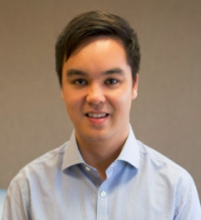Robert Hanson, who started his MRes research project in 2018 explains his research and why he applied to the CRUK Cambridge Centre for a non-clinical studentship...
What is your research project all about and what impact could it have on the way we understand, detect or treat cancer?
I joined the CRUK-Cambridge Centre in October 2018. The MRes component of my course consists of two distinct research rotations in different laboratories. Both of my research projects are aligned to the CRUK Urological Malignancies and Early Detection programmes.
I am currently based in the Massie lab, investigating therapeutic combinations in prostate cancer and characterising predictive biomarkers for aggressive prostate malignancy.
Within prostate cancer, it can be challenging to predict a patient’s course of disease. Different patients demonstrate a broad range of clinical outcomes – ranging from those who unfortunately show rapid disease progression and metastatic spread, whilst there are many patients which progress very slowly (or not at all) and may never become symptomatic. With global cases of prostate cancer rising, it is not only important to detect cancer cases earlier, but to also implement biomarkers to forecast individual outcomes, improve risk stratification and guide disease management. Ultimately, this is essential in matching the right patients to the right therapeutics and treatment pathways.
For my second rotation, I will be working in the Rosenfeld group, with a project focussing on the use of circulating tumour DNA (ctDNA) as a non-invasive diagnostic tool to detect cancer. ctDNA is tumour-derived fragmented DNA which can be detected in the bloodstream by using cutting-edge genomic technologies.
The use of ctDNA as a cancer-specific biomarker has significant implications in improving how we detect and monitor cancers. At present, there remains numerous questions about the biology of ctDNA and clinical deployment. Could there be additional cancer genomic secrets in the blood of patients which could be further informative of disease biology?
What were you doing before you started your MRes?
Prior to joining CRUK, I completed AstraZeneca's IMED Graduate scientist programme- a two-year training internship where I gained broad exposure to different stages of the drug discovery process. Here I completed placements in Oncology Translational Science, Drug Safety & Metabolism and Oncology Bioinformatics.
After finishing the AZ graduate programme, I felt motivated to pursue PhD studies to further develop my skills as a researcher. Prior to joining AstraZeneca, I completed my undergraduate studies at the University of Keele in 2016, graduating with a BSc. Biochemistry with Human Biology, including a year in industry.
Why are you interested in cancer and what do you see yourself doing after your MRes and then PhD?
During my undergraduate degree, my interests in cell biology and biochemistry were broadened, and I found myself intrigued by the molecular mechanisms which disrupt the cellular network leading to disease. Beyond science, my volunteering experience during my undergraduate studies within a palliative care cancer hospice also provided a powerful steer towards translational and patient-centric research.
My internship at AstraZeneca exposed me to precision medicine approaches to oncology drug discovery and advancements in technologies which drive this field. Although great progress is being made, cancer remains a complex global burden and there is still plenty of research to be done to translate more discoveries to the clinic and ultimately improve patient outcomes. This is especially the case as we move deeper into the realms of cancer early detection and start to consider how to best manage the disease in early stage patients. After completing PhD, I’d hope to continue to build a career in translational science and continue to broaden my knowledge.
Why did you want to study in Cambridge?
I was working in Cambridge prior to starting my studies and recognised the area as a vibrant science hub with numerous opportunities. I am based on the Cambridge Biomedical Campus which is a place which brings together my love for science and passion for improving patient lives. This is an environment where world-class collaborations between academia, industry and clinicians thrive – working together to innovate and deepen our understanding of cancer and precision medicine.
What are the best, and worst, things about being a graduate student here?
Best – The opportunity to work collaboratively with great teams. Coming to work every day and knowing that you are playing a part in driving a research project forward which aims to positively impact patients. The MRes year has a great training programme and provides the opportunity to broaden knowledge and learn different techniques from the rotations.
Worst – Bitter-sweet in that, as Cambridge is a great place to study, for the curious minds the amount of interesting opportunities can sometimes exceed time availability!
Robert's projects are part of the Urological Malignancies and Early Detection Programmes
















